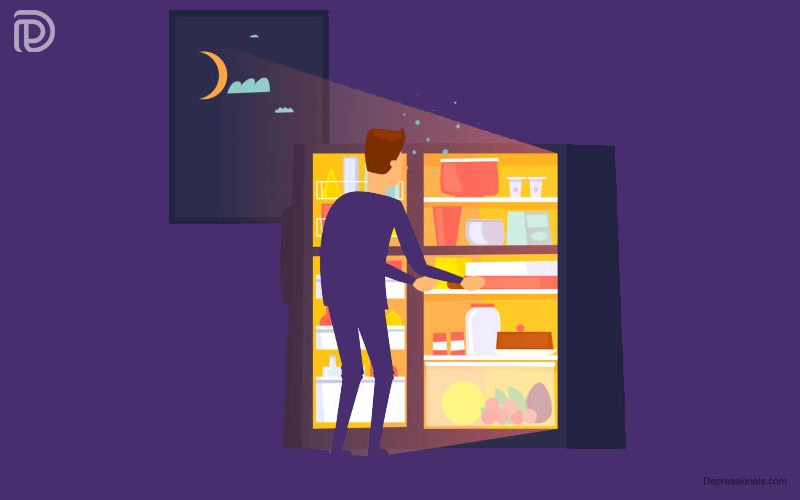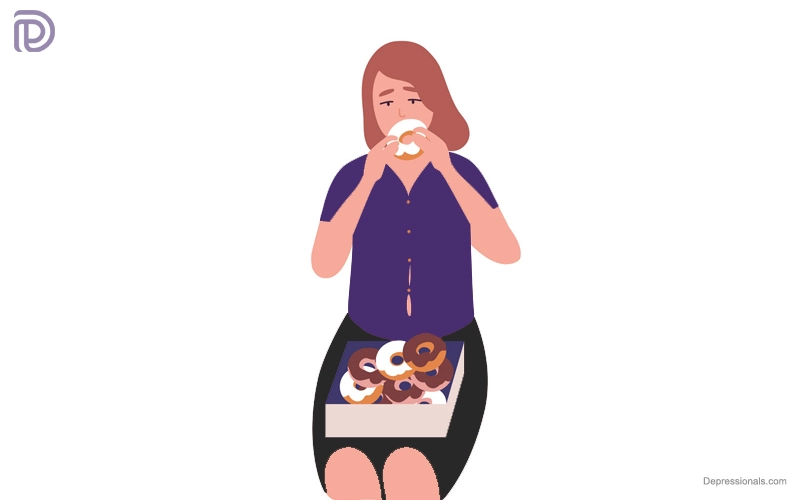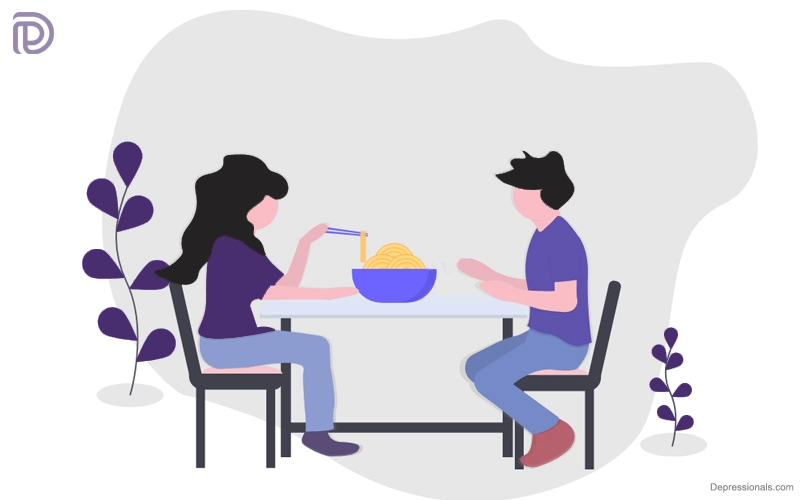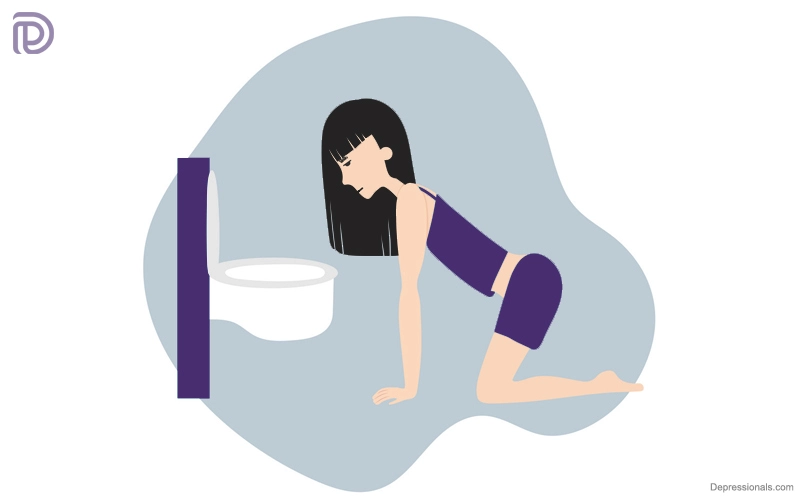This article is a guide for you on how to stop late night eating. It’s common to eat late at night, even when you’re not hungry. It may be harmful to eat during the night if you eat more than your body needs, which could lead to weight gain.
These 10 tips will help you stop late night eating or in the evening.
10 Tips to stop late night eating
1. Determine the cause
It is not uncommon for some people to eat most of their food during the evenings or at night.
However, you have to determine why you do it.
It may be that nighttime eating is a result of eating too little during the day. It may also be due to habit or boredom.
Even though nighttime eating has been associated with some eating disorders, including night eating syndrome and binge eating disorder.
Although these disorders feature different eating habits and behaviors, they can both negatively affect your health.
It is common for people to turn to food when they are feeling sad, angry, or frustrated, and they generally eat even when they are not hungry.
Additionally, binge eaters tend to consume very much food in one sitting and have a feeling of being out of control as they eat.
On the other hand, individuals who suffer from nighttime eating syndrome tend to graze throughout the evening and sometimes wake up in the middle of the night to eat, thus consuming at least 25 percent of their daily calories at night.
Both conditions are associated with obesity, depression and sleep problems.
There are several possible causes of nighttime eating, including boredom, hunger, binge eating disorders, and nighttime eating syndrome. If you can identify the cause of the problem, you will be in a better position to correct it.
Read: How to Deal with Frustration
2. Identify what triggers you
You may also find it useful to examine a pattern of events that typically trigger your overeating behavior along with identifying the general cause of your eating disorder.
There are many reasons why people eat. It may be hard to understand what led you to eat at night even if you aren’t hungry.
Sometimes you’ll find that you use food to satisfy a need that isn’t hunger.
You may experience nighttime eating syndrome if you don’t have a strong appetite during daytime hours.
It is important to keep a “food and mood” diary if you want to determine what triggers your nighttime eating.
You can identify negative patterns of behavior by tracking your eating habits, your exercise routine and your feelings. This will allow you to break these cycles of behavior.
By understanding what triggers you to consume food at night and monitoring your behavior patterns, you can overcome cycles of emotional eating.
3. Create a routine
Establishing a routine may help you avoid overeating when you don’t eat enough throughout the day.
It is easier to stay hungry at night when you have a structured eating and sleeping schedule.
You must get good quality sleep if you want to manage your diet and weight.
Study results reviewed in 2015 found that poor sleep quality and low sleep duration were associated with higher calorie intake and lower diet quality. If a person doesn’t get adequate sleep for a long time, they’re at greater risk of developing obesity.
In the review, the authors noted that, although sleep plays a key role in eating patterns, other factors such as hormones related to appetite and the time since the meal are consumed play a role, as well.
Setting specific times to eat and to sleep can help reduce the chances of waking up in the middle of the night to eat.
You can break unhealthy cycles of behavior by having a regular mealtime and sleep schedule. This can help if you are hungry during the day and tend to overeat later in the evening.
Read: 15 Simple Tips to Stop Binge Eating
4. Make a meal plan
A meal plan may also be beneficial as part of your routine.
You can reduce the possibility of eating on impulse and making poor food choices by planning your meals and eating healthy snacks.
A 2013 study determined that food and impulsivity go hand in hand. Overweight or obese individuals with BED or without the condition participated in this study. It was found that the mere sight of food could be a trigger for the body’s disinhibition response and reward system. Those who had BED were more likely to experience this.
A meal plan can also help you manage your weight and keep you from feeling hungry by spreading your food throughout the day.
Meal planning helps you control how much food you consume and keep from getting hungry.
5. Get emotional support
You may want to consult a doctor if you suspect nighttime eating or binge eating disorder.
You can get help identifying your triggers and setting up a treatment plan if you need it by asking them to refer you to a mental health professional.
Cognitive behavior therapy (CBT) has proven to be effective in treating many eating disorders.
Three different therapeutic treatment methods, including CBT, were compared in a randomized controlled study on 205 people who have confirmed BED diagnoses in 2015. Researchers found that CBT produced the best results, both short and long term (remission).
You’ll also learn how to handle negative emotions, which would otherwise make you reach for the refrigerator.
It’s sometimes a good idea to get professional help and support if you have an eating disorder and have trouble sleeping.
Read: How to Deal with Social Anxiety
6. De-Stress
The most common causes of eating when one is not hungry are anxiety and stress. In general, food can be used as a temporary solution to curb your emotions.
When you are stressed or anxious, try to find other ways to let go of negativity and relax.
In research studies, relaxation techniques have been shown to assist in the treatment of eating disorders such as nighttime eating syndrome and binge eating.
In one study from 2003, 20 people who had been diagnosed with night eating syndrome were randomly assigned to one of two groups for two weeks over the course of equivalent amounts of time.
APRT was given to one group, while a controlled relaxation environment was used in the second group. Researchers found participants who got 20 minutes of APRT reduced their stress levels.
After practicing this technique for eight days, participants showed lower nighttime hunger rates and a higher rate of morning hunger.
You might also find these relaxation techniques helpful:
- Breathing exercises
- Meditation
- Hot baths
- Yoga
- Gentle exercise
- Stretching
Try relaxation techniques, gentle exercise, or stretching instead of eating when you’re feeling stressed or anxious.
Read: Stress Management Techniques
7. Eat regular meals throughout the day
It has been shown that overeating at night can lead to erratic eating patterns that are associated with disordered eating. You can help keep your blood sugar stable by eating at regular intervals during the day according to your “normal” eating pattern.
Additionally, it can reduce the feeling of hunger, fatigue, irritability or a perceived lack of food, which can lead to bingeing. A hungry person is more likely to choose unhealthy foods and reach for fattening, sugary, and processed foods.
Studies have found that those eating regular meals (three or more times per day) lose weight and have better control over their appetites. The ability to control your appetite and food choices is diminished if you eat less than three times a day.
Although mixed results have been reported so far, it’s important to keep in mind that the results vary. Individuals likely differ in the amount and frequency of foods they consume, as well as the frequency at which they consume them.
Managing your hunger and food cravings can be easier with regular meals.
8. Eat protein with every meal
Different foods can affect your appetite in different ways. A protein-rich meal may be helpful to stop late night eating if you eat out of hunger. Additionally, it might make you feel more full during the day, stop you from having a preoccupation with food, and keep you from snacking late at night.
The research compared the effects of eating high-protein vs. low-protein (HP) meals and the frequency of eating them in 2011 to determine whether this combination method was effective at reducing hunger. There were 47 overweight or obese men who took part in the study. Generally, high-protein meals reduced cravings by 60% and reduced the desire to eat at night by half, though the frequency of consumption did not affect outcomes significantly.
Research shows that protein helps you feel full longer. It is important to include protein at every meal to control cravings and reduce nighttime eating.
Read: 8 Most Effective Anxiety Breathing Exercises
9. Keep a supply of healthy snacks on hand
Try to limit your consumption of fattening, sugary, and processed food if you are prone to them. You are much less likely to eat snacks with low nutritional value if they aren’t readily available.
Don’t forget to fill your house with foods that are nutrient-rich. So you won’t eat junk if you’re hungry. Keeping fruits, nuts, berries, plain yogurt, and cottage cheese in your fridge is a great idea if you get hungry.
Limit your intake of low-nutrition foods. You will not be tempted to eat less nutritious snacks if they are not readily available.
10. Distract yourself
Find something else you enjoy doing in the evening if you are thinking about food because you’re bored.
Get moving, talk to your friends, read or research recipes for healthy recipes. Keeping your mind busy will help you stay healthy.
It is possible to prevent mindless late-night snacking by taking up a new hobby or organizing evening activities. You can occupy your mind in the evening with something else you enjoy doing if you are eating out of boredom.
Read: Avoidant Restrictive Food Intake Disorder
In conclusion
There has been a link between nighttime eating and excessive calories, obesity and poor health. Consider trying the steps above if you have trouble eating at night. Hopefully, they will help you to stop late night eating.






You can definitely see your skills in the work you write. The world hopes for more passionate writers like you who are not afraid to say how they believe. Always go after your heart.
Really fantastic info can be found on website. “The fundamental defect of fathers is that they want their children to be a credit to them.” by Bertrand Russell.